|
In a small city of Aarhus, in Denmark, from June 23 - 25 this year, The Fourth Pan-European Ministerial Conference on Environment took place. At the same time, from June 19 - 25, parallel environmental NGO conference occurred in the same town, where about 250 participants from 44 countries represented their stands and contributed to the "Environment for Europe" process: |
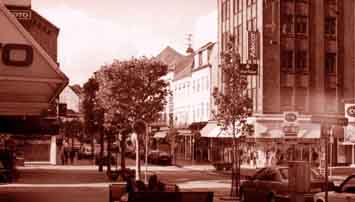
HOW TO MAKE LIVING SUSTAINABLE AARHUS, DENMARK |
| " ...There are not many fields where effective cooperation in continental
or even global scale is so necessary, like in the field of environmental
protection and restoration. Not a single group of countries can solve the
severe legacy of environmental deterioration and find ways towards sustainable
future, alone. Environmental cooperation is thus not only the necessary
condition for substantial improvements of our ecological situation also
the most natural first step of European integration..." Those are the words
of Josef Varvousek ( 1944 - 1995 ), former Czechoslovakian Minister of
the Environment and initiator of the first Pan-European Conference on Environment
in Dobris, 1991.
"Environment for Europe" process has started in 1991 as an international activity after political changes in East Europe with the main goal to obtain framework for financial support to environmental problems resolving in the countries in transition. The first conference took place in Dobris, in ex Czechoslovakia and Conferences in Lucerne ( Switzerland, 1993 ), Sofia (Bulgaria, 1995 ) and Aarhus (Denmark, 1998 ) followed it. The highest achievements are preparation for the Environmental Report ( Dobris Report ), adoption of NEAPs ( National Environmental Action Plans ) that are development strategies in accordance with Agenda 21, the major document adopted on the UNCDs "Earth Conference", 1992 in Rio de Janeiro (Brazil), and were to be document with the development priorities of each country but compatible with the European development. The most important results of the Sofia conference are, so called, Sofia Initiatives - priority issues for the countries of Central and Eastern Europe (local air quality, economic instruments for, environmental impact assessment, biodiversity initiative and public participation) Aarhus conference had a task to evaluate success so far and to bring a decision on future of the "Environment for Europe" process. |
| This year was the most significant for the whole movement in
Europe since non - governmental organizations were recognized as an equal
partner in environmental policy and decision making process:
"We (Ministers for Environment and head of delegations from 37 countries,
undersigning this declaration) recognize and support the crucial role played
in society by the environmental NGOs as an important channel for articulating
the opinions of the environmentally concerned public. An engaged, critically
aware public is essential to a healthy democracy. By empowering individual
citizens and environmental NGOs to play an active role in environmental
policy-making and awareness - raising, the Aarhus Convention will promote
responsible environmental citizenship and enable all members of society
to fulfill their duty, both individually and in association with others,
to protect and improve the environment for the benefit of present and future
generations."
|
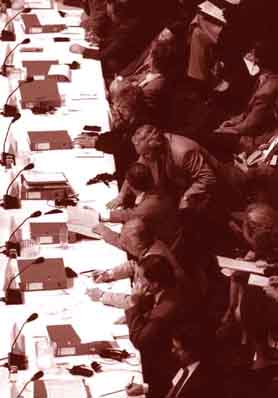
MINISTERS AT WORK- AARHUS CONFERENCE |
| The Aarhus Conference was outstanding opportunity for all to
display and perform active role in the long term process of environment
protection and care and, particularly, in sustainable development.
The following documents have been accepted and undersigned by the participating ministers, however, not by all of them:
|
 |
| The NGO conference was organized by European ECO Forum and has a task
to focus efforts of the "third sector" in obtaining proper and acceptable
terms for future European sustainable development. From the last Ministerial
conference in Sofia, in 1995, NGO fought for their stands and terms in
the final declaration but also very much for the proper creation and implementation
of environmental governmental policies, this particularly through good
practice examples - pointing out to the adequate and acceptable solutions.
The results of the parallel NGO conference are as follows: |
On the plenary session reports of the Issue Groups and Steering Committee
has been discussed and adopted. 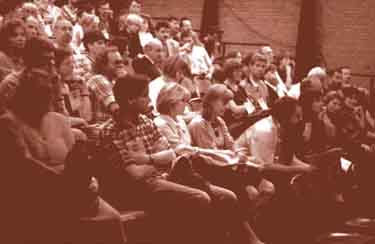
NGOS AT WORK - DARK HALL BUT BRIGHT IDEAS |
The work of all members of the ECO Forum from the last Ministerial Conference in Sofia and particularly from the Bled Meeting, in November last year, resulted with Arhus Convention that has been produced with the highest participation of NGOs. Also Task Forces from Isue Groups succeeded to influence the Aarhus Declaration and other relevant documents implementing stands of European NGOs. |
| o A whole number of workshops give the final definition of particular
issues in regard to the NGO community. Those stands were basis for lobbing
governments to accept or try to make certain changes in the final Aarhus
documents.
o Also numerous educational events and activities helped Conference participants to understand better the real problem and possible approach to some solutions, particularly through good practice examples. o The General Assembly of the European ECO Forum occurred in the Aarhus and the most important result is that ECO Forum was established as a formal Pan-European NGO organization and no more as informal coalition. This formalization will enable firmer and more respectable work of all the members giving them a mandate for representing the real stand of particular organizations, coalitions or networks from the countries or regions. Tighter organization will also enable procedures for more efficient work. o Organizational structure of the European ECO Forum is set up with Coordinating Board consisted of Issue Groups Coordinators and Regional Focal Points Coordinators. The whole operational work is performed through ECO Forum Secretariat that is posted in Ljubljana, Slovenia. |
The GREEN TABLE was one of the very few participants from Yugoslavia. 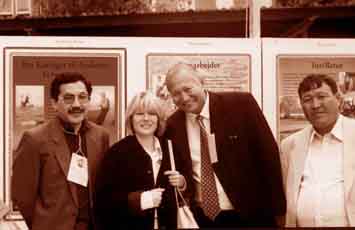
THE GREEN TABLE IN ACTION - I LIDIJA WITH PARTICIPANTS OF ARAL SEA PROJECT |
However, we were the only ones that had not our official, governmental delegation at the ministerial conference.This makes the whole task for us even harder as were not able to lobby our government to sign documents or to fight for needed changes. On the other hand, we tried to compensate mentioned disadvantage by being as activeas possible at the coference. Our task was present our experience and to try to represent in the best manner work of Yugoslavian NGOs as well as to improve position of our NGOs in European non - governmental community: |
| · We have been deeply involved, as a member of Drafting Group and over 6 months, in creating the concept of European ECO Forum formalization and it's Statute. We have paid a special attention and placed considerable efforts in aim to obtain terms that will enable Yugoslavian NGOs to become active participants of ECO Forum bodies as well as part of European NGO activities and initiatives. | 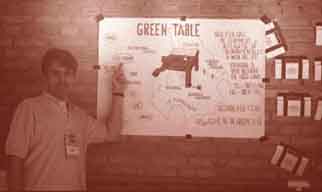 GREEN TABLE IN ACTION - II
GREEN TABLE IN ACTION - II
DUSAN IN FRONT OF OUR POSTER |
|
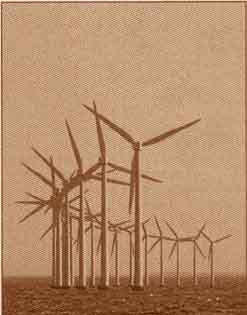
SETTING UP RENEWABLE ENERGY WINDMILLS IN DENMARK |
| We consider our results very successful
in respect to the position of our country and our internal situation.
Follow up: b) We will publish a special issue of our Bulletin on Aarhus Conference c) We will implement European environmental policy guidelines in to our further projects, promoting such contemporary approach to sustainable development d) In accordance with burning issues from our own country, we are going to create programs that will be trying to solve them but under the standards of e) We will keep in intense contact with European NGO community updating our work with international experience of modern, democratic society ( renewable energy projects, waste recycling projects, educational projects ). f) Special attention and care will be paid to development of and care for "Balkan Initiative". This we found particularly important and interesting for further reinforcement of this region, especially NGOs, and common activities on common problems. At the same time, mutual efforts will deliver strength and importance of NGOs that cannot be neglected in the public participation and decision making process. Such position than will enable or, at least, make easier realization of social programs that will bring better future for all stake holders and particularly the most imperiled ( women, children, refugees - from the social point of view and all of us from the environmental point of view ). The first mutual project is an advocacy campaign against creating a nuclear waste disposal in Gabrovnica, abandoned uranium mine in East Serbia, on the very boarder with Bulgaria. The campaign has already started and we got substantial international support that will be used in domestic part of it. |